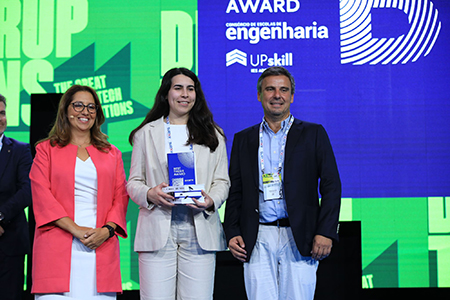With the support of CEE – Consortium of Engineering Schools, APDC – Portuguese Association for the Development of Communications, launched in February 2021, the Best Thesis Award, with the purpose of rewarding anually the best master’s dissertations in the areas of Information Technology, Telecommunications and Media.
On May 10, Beatriz Almeida Miranda, student of the Master in Multimedia of the U. Porto, will go on stage in the 32nd Digital Business Congress of APDC, to receive the distinction of best master’s dissertation in the area of media, with the work entitled “Immersive VR eHealth Strategies: VR games to treat schizophrenia negative symptoms“, which was conducted under the guidance of Professors Paula Alexandra Carvalho de Sousa Rego (IPVC) and António Fernando Vasconcelos Cunha Castro Coelho (DEI/FEUP), who tell us a little about this dissertation:
“Schizophrenia is a mental disorder that resorts to cognitive rehabilitation treatments to help reduce symptoms that cannot be treated with medication. In general, pharmacological treatments are not effective in controlling the negative symptoms of the illness. Negative symptoms include, among others, decreased motivation and interest in performing simple activities. In this context, this thesis aimed to contribute to the study of the application of serious Virtual Reality (VR) games in the treatment of negative symptoms in patients diagnosed with schizophrenia, through the development of a prototype of a serious game in Virtual Reality (VR) that simulates spaces and tasks of daily life activities, proposing the resolution of problems, with the ultimate purpose of recovering autonomy and increasing motivation to perform tasks in patients diagnosed with the schizophrenia spectrum. The prototype was validated with a sample of healthy participants with very interesting and relevant results for the project, which indicate good prospects for use with patients. The study and the results obtained allowed us to identify a set of important characteristics that can be useful in the development of games in this area. This thesis was developed in the context of a larger project – Greenhealth, which has IPVC as a partner (together with IPB, IPCA, IPP and ULSNE)”.
Chatting with Beatriz, she told us about the immense satisfaction of receiving this distinction: “Having my work recognized means a lot to me. When I started it I knew very little about the subject I chose, which made me work even harder to develop a thesis with the level of rigor I wanted. This distinction served as yet another demonstration that I successfully achieved my goal. Despite this, I feel that in the end the greatest prize I won was my personal growth. I believe that this research has served not only as a way to help in the development of better solutions for the for the treatment of schizophrenia, but also as a way to help demystify misconceptions that exist about the usefulness of games and about the way we see and deal with mental illnesses.”
As for the future, Beatriz wants to finish the research project she is working on, GreenHealth, and then enter the job market, preferably in a company that works in the area of Virtual Reality.
In the 2022 edition, Aisha Animashaun, also an alumna of the Master in Multimedia, received this same distinction with the work entitled “Generative Soundscapes for Enhanced Engagement in Non-Invasive Neurorehabilitation”, a proposal for a generative strategy of sound environments to dynamically mask the frequency bands of the noise identified with negative auditory stimuli, to promote a relaxing soundscape from a range of ambient sounds connoted in the literature with low degrees of valence and arousal, in dementia patients.
In the 1st edition of this award, back in 2021, André Cruz, Alumnus of the Integrated Masters in Informatics and Computer Engineering, was also distinguished in the area of Information and Communication Technologies, with the dissertation “Fairness-Aware Hyperparameter Optimisation”, which focused on the study of biases and potential discriminations in the use of artificial intelligence systems related to gender, age, ethnicity or geographical location.
